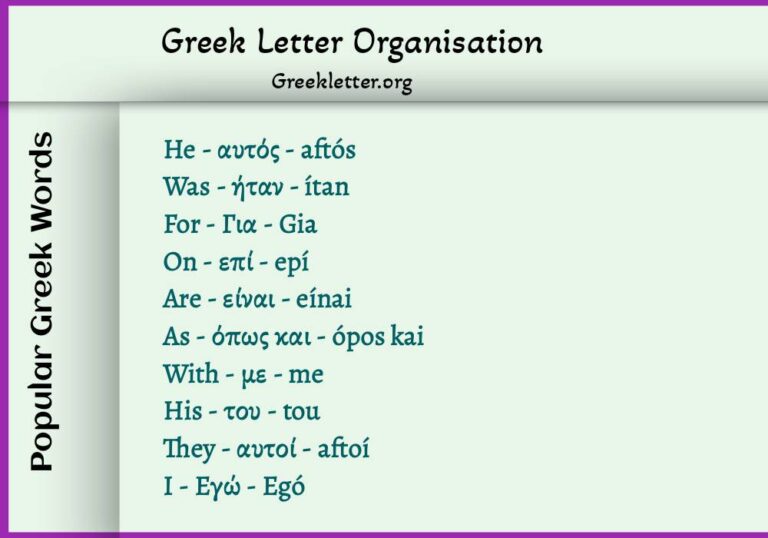Greek Numbers 1-100: This Chart Have All Words
The Greeketter.org is the perfect way to learn the Greek language alphabet letters and numbers.
In this article, you’ll learn Greek numbers 1-100, making it the ultimate free resource for this important language skill.
By the end of the program, you’ll be able to read and write in Greek fluently, giving you a valuable tool for communicating with native speakers.
Whether you’re a math whiz or just trying to learn the basics, understanding Greek numbers can be helpful.
This chart provides a complete list of Greek numbers 1 to 100, including both word and numeric forms.
With this information at your disposal, you’ll be able to tackle any mathematical problem that comes your way!
| No | Greek Word | Pronunciation In English |
| 1 | ένα | ena |
| 2 | δύο | thio |
| 3 | τρία | tria |
| 4 | τέσσερα | tessera |
| 5 | πέντε | pendi |
| 6 | έξι | exi |
| 7 | εφτά | efta |
| 8 | οχτώ | ochto |
| 9 | εννιά | ennea |
| 10 | δέκα | theka |
| 11 | έντεκα | endeka |
| 12 | δώδεκα | thotheka |
| 13 | δεκατρία | thekatria |
| 14 | δεκατέσσερα | thekatessera |
| 15 | δεκαπέντε | thekapende |
| 16 | δεκαέξι | thekaexi |
| 17 | δεκαεπτά | thekaepta |
| 18 | δεκαοχτώ | thekaochto |
| 19 | δεκαεννέα | thekaennea |
| 20 | είκοσι | ikosi |
| 21 | είκοσι ένα | ikosi ena |
| 22 | είκοσι δύο | ikosi thio |
| 23 | είκοσι τρία | ikosi tria |
| 24 | είκοσι τέσσερα | ikosi tessera |
| 25 | είκοσι πέντε | ikosi pendi |
| 26 | είκοσι έξι | ikosi exi |
| 27 | είκοσι εφτά | ikosi efta |
| 28 | είκοσι οχτώ | ikosi okto |
| 29 | είκοσι εννιά | ikosi – ennia |
| 30 | τριάντα | trianda |
| 31 | τριάντα ένα | trianda ena |
| 32 | τριάντα δύο | trianda thio |
| 33 | τριάντα τρία | trianda tria |
| 34 | τριάντα τέσσερα | trianda tessera |
| 35 | τριάντα πέντε | trianda pendi |
| 36 | τριάντα έξι | trianda exi |
| 37 | τριάντα εφτά | trianda efta |
| 38 | τριάντα οχτώ | trianda okto |
| 39 | τριάντα εννιά | trianda ennia |
| 40 | σαράντα | saranda |
| 41 | σαράντα ένα | saranda ena |
| 42 | σαράντα δύο | saranda thio |
| 43 | σαράντα τρία | saranda tria |
| 44 | σαράντα τέσσερα | saranda tessera |
| 45 | σαράντα πέντε | saranda pendi |
| 46 | σαράντα έξι | saranda exi |
| 47 | σαράντα εφτά | saranda efta |
| 48 | σαράντα οχτώ | saranda okto |
| 49 | σαράντα εννιά | saranda ennia |
| 50 | πενήντα | peninda |
| 51 | πενήντα ένα | peninda ena |
| 52 | πενήντα δύο | peninda thio |
| 53 | πενήντα τρία | peninda tria |
| 54 | πενήντα τέσσερα | peninda tessera |
| 55 | πενήντα πέντε | peninda pendi |
| 56 | πενήντα έξι | peninda exi |
| 57 | πενήντα εφτά | peninda efta |
| 58 | πενήντα οχτώ | peninda okto |
| 59 | πενήντα εννιά | penindav ennia |
| 60 | εξήντα | exinda |
| 61 | εξήντα ένα | exinda ena |
| 62 | εξήντα δύο | exinda thio |
| 63 | εξήντα τρία | exinda tria |
| 64 | εξήντα τέσσερα | exinda tessera |
| 65 | εξήντα πέντε | exinda pendi |
| 66 | εξήντα έξι | exinda exi |
| 67 | εξήντα εφτά | exinda efta |
| 68 | εξήντα οχτώ | exinda okto |
| 69 | εξήντα εννιά | exinda – ennia |
| 70 | εβδομήντα | evthominda |
| 71 | εβδομήντα ένα | evthominda ena |
| 72 | εβδομήντα δύο | evthominda thio |
| 73 | εβδομήντα τρία | evthominda tria |
| 74 | εβδομήντα τέσσερα | evthominda tessera |
| 75 | εβδομήντα πέντε | evthominda pendi |
| 76 | εβδομήντα έξι | evthominda exi |
| 77 | εβδομήντα εφτά | evthominda efta |
| 78 | εβδομήντα οχτώ | evthominda okto |
| 79 | εβδομήντα εννιά | evthominda ennia |
| 80 | ογδόντα | ogthonda |
| 81 | ογδόντα ένα | ogthonda ena |
| 82 | ογδόντα δύο | ogthonda thio |
| 83 | ογδόντα τρία | ogthonda tria |
| 84 | ογδόντα τέσσερα | ogthonda tessera |
| 85 | ογδόντα πέντε | ogthonda pendi |
| 86 | ογδόντα έξι | ogthonda exi |
| 87 | ογδόντα εφτά | ogthonda efta |
| 88 | ογδόντα οχτώ | ogthonda okto |
| 89 | ογδόντα εννιά | ogthonda ennia |
| 90 | ενενήντα | eneninda |
| 91 | ενενήντα ένα | eneninda ena |
| 92 | ενενήντα δύο | eneninda thio |
| 93 | ενενήντα τρία | eneninda tria |
| 94 | ενενήντα τέσσερα | eneninda tessera |
| 95 | ενενήντα πέντε | eneninda pendi |
| 96 | ενενήντα έξι | eneninda exi |
| 97 | ενενήντα εφτά | eneninda efta |
| 98 | ενενήντα οχτώ | eneninda okto |
| 99 | ενενήντα εννιά | eneninda ennia |
| 100 | εκατό | ekato |
Greek Numbers 1 to 100 are easier to learn.
When it comes to learning Greek numbers 1 to 100, it’s quite easy. You can learn them in just a few minutes with this simple guide.
First, start by memorizing the numbers 1 to 10. This is the most important part and will lay the foundation for everything else.
| Must Read |
Once you know the numbers 1 to 10, you can easily learn the rest using a simple pattern. For example, 11 in Greek is έντεκα (endeka), 12 is δώδεκα (dodeka), and 13 is δεκάτρια (dekatria).
How the Greeks Wrote Numbers in Words
The Greeks had a unique way of writing numbers in words. They would start by writing the number 1 as “ener,” 2 as “dyo,” and 3 as “tri.” Then, they would continue to 4 by adding a “tessera” to the end of “tri,” making it “tritessa.” 5 would be written as “pente,” 6 as “hex,” 7 as “hept,” 8 as “octo,” 9 as “ennea,” and 10 as “deca.”
| No | Greek | Pronunciation in English |
| 20 | είκοσι | ikosi |
| 30 | τριάντα | trianda |
| 40 | σαράντα | saranda |
| 50 | πενήντα | peninda |
| 60 | εξήντα | exinda |
| 70 | εβδομήντα | evthominda |
| 80 | ογδόντα | ogthonda |
| 90 | ενενήντα | eneninda |
| 100 | εκατό | ekato |
| 101 | εκατόν ένα | ekatón éna |
| 200 | διακόσια | diakósia |
| 300 | τριακόσια | triakósia |
| 400 | τετρακόσια | tetrakósia |
| 500 | πεντακόσια | pentakósia |
| 600 | εξακόσιες | exakósies |
| 700 | εφτακόσια | eftakósia |
| 800 | οχτακόσια | okhtakósia |
| 900 | εννιακόσια | enniakósia |
| 1000 | χίλια | khília |
| 2000 | δύο χιλιάδεςdío | khiliádes |
| 100,000 | εκατό χιλιάδες | ekató khiliádes |
| 100,0000 | ένα εκατομμύριο | éna ekatommírio |
To write numbers 11-19, the Greeks would take the number 10 and add a prefix, indicating how many more than 10 it was.
You won’t believe which numbers are of Greek origin!
You might be surprised to learn that many of the numbers we use today are of Greek origin. The number zero, for example, was first used by the Greeks.
They also invented the concept of infinity and developed a sophisticated geometry system. Even the numbers we use to measure time—seconds, minutes, hours—are derived from Greek words. So next time you reach for your calculator, think of the ancient Greeks and their contributions to mathematics!
How to read (and use) a Greek numerals chart
To read and use a Greek numerals chart, there are a few things you need to know. The first is that the alphabet’s letters represent numbers in this system, with each letter having a different value.
The second is that three different charts depend on what you’re looking for: one for cardinal numbers, one for ordinal numbers, and one for fractions.
To read a cardinal number chart, find the letter corresponding to the number you’re looking for and read its value.
For example, if you’re looking for the number 5, you would find the letter “E” on the chart and read it as “5.” To use a cardinal number chart, use the values provided to calculate whatever sum or difference you need.
The Easiest Way to Understand the Greek Number Chart
The easiest way to understand the Greek number chart is to use it as a reference when looking at a list of numbers. The chart can be found online and in most math textbooks. It is also available in some languages other than English.
To use the chart, find the number you are interested in on the left-hand side and trace it across to the right until you find its equivalent value in Greek numerals. For example, if you are looking for the number five, you would find it on the left side of the chart and then trace it across to the right until you reach (5).
If you need help understanding how to use the chart, many videos and articles online can help explain it further.
English speakers have been using Greek numbers for centuries – find out why!
In the English language, many words have been borrowed from other languages. One such borrowing is the use of Greek numerals. Although most people are unaware, English speakers have used Greek numbers for centuries.
There are several reasons why English speakers started using Greek numerals. One reason is that the Latin alphabet does not have symbols for numbers higher than 9. This made it difficult to write large numbers in Latin. However, the Greek alphabet has symbols for numbers up to 999.
Another reason is that Roman numerals are based on the number 7, which is considered unlucky by many cultures. The Greeks had a different numbering system that was based on 10, which is a lucky number. Therefore, using Greek numerals was seen as a way to bring good luck.
Why Greek Numerals May be the Key to Understanding the Universe
The ancient Greeks were onto something when they devised their numbering system. Greek numerals may be the key to understanding the universe.
The Greek numbering system is based on powers of ten. This is a universal principle. The universe is also based on powers of ten. From quarks to galaxies, the entirety of the cosmos can be described using the framework of ten.
The ancient Greeks understood this principle and used it in their numbering system. Greek numerals may be the key to understanding the universe because they are based on a universal principle.
Conclusion Points
The Greek numbering system is used in the writing of numbers in Greece. It uses the letters of the Greek alphabet to represent numbers from 1 to 100. The system is similar to the one used in English, with a few differences. The letters of the Greek alphabet are assigned numerical values as follows:
The first 24 letters represent numbers from 1 to 100.The next three letters, Π, Ρ, and Σ, represent 200, 300, and 400, respectively.
The next four letters, Τ, Υ, Φ, and Χ, represent 500, 600, 700, and 800, respectively. Finally, the last letter of the Greek alphabet, Ω, represents 900.
FAQs
Do you need help to learn Greek numbers 1 to 100? Do you feel like you’re never going to get them memorized? Well, struggle no more! With the FAQs section of Greekletter.org, we make learning Greek numbers easy and fun. We provide important questions and answers to help you understand the concept better.
Plus, you can write your question in the comment box, and we’ll happily answer it. So what are you waiting for? Start learning today!
Question (1) – How to Write 100 in Greek Numerals?
Answer: In mathematical notation, 100 can be written as 100 or 1, followed by 9 zeros. In Roman numerals (which we use in English), 100 would be written as CXCV. To write 100 in Greek numerals, the first step is to convert the Roman numerals into Greek. So, to write 100 in Greek numerals, you would write “1 χξης” (one chia).
Question (2) – Why is 666 significant in Greek mythology?
Answer: In Greek mythology, the number 666 is significant because it is the sum of the first four integers (1, 2, 3, 4). These numbers are associated with the Greek god Zeus and are considered symbols of power and strength.
Question (3) – How does 666 relate to other Greek numbers?
Answer: In Greek, the number six comprises the letters alpha, beta, gamma, delta, epsilon, and zeta. These letters are also the first five letters in the word “Hades,” which is the name of the Underworld or place of departed souls in Greek mythology.
Adding these letters together (65) results in a number pronounced “seventy-six.” 666 is pronounced “six hundred sixty-six” in English.
Question (4) – Why does Greece’s phone country code have 666?
Answer: Greece is a part of the European Union, so its country code is 39. The country code for Greece is also the international dialing code for Greece, which is 662. However, because 666 is considered evil in many religious circles, the Greek government decided to include it as part of the country code for convenience.
Question (5) – How to Use the Greek Number 50 in Math and Science?
Answer: One way to use the Greek number 50 is in mathematics and science. For example, if you want to find the area of a square with sides of 5 meters, you can use the formula A = r². To find the value of 50 in this equation, you would add all the numbers (5 + 4 + 3 + 2 + 1), which equals 12.
The Greek number 50 (5-6) has a meaning in math and science. In math, it represents the number five to the power of six (5^6), 100. In science, 50 is used as the atomic number for uranium.
Question (6) – How to correctly pronounce Greek numbers?
Answer: There are several ways to say “seven” in Greek, depending on the region of Greece where you are speaking. In the north of Greece, for example, people might say “septem” (pronounced “sept-ehm”). In the central and southern regions, however, people might say “oktober” (pronounced “OCK-toh-Behr”).
Question (7) – Why is the Greek number system still used today?
Answer: The Greek number system is still in use today because it is very efficient for counting and manipulating numbers. It also has a long history of being used in mathematics and other sciences. Many other systems could be more efficient, but the Greek system has proven versatile and useful.
Question (8) – What Is the Origin of the Greek Numbering System?
Answer: The Greek numbering system is derived from the Babylonian numbering system. The Babylonians were the first people to use a positional numeral system.
The Greeks adopted the Babylonian system, modified it, and added symbols. The Greeks also created a new word for numbers, διάφορα (diafrória), which means “different.
Question (9) – How the Greek number system was used to understand the universe?
Answer: The Greek number system was used in antiquity to understand the universe. The Greeks believed the universe was divided into nine areas, each ruled by a different god or goddess.
They used the letters of the alphabet to represent these areas and created special symbols to represent numbers. For example, the symbol for four (Φ) represented the number 4. The Greeks also used the letters of the alphabet to represent other mathematical concepts, such as addition and multiplication.






